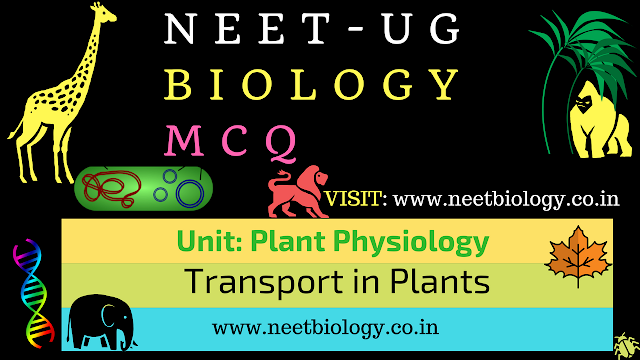1. Stomata
open at night in
a) hydrophytes
b)halophytes
c) mesophytes
d) succulents
2.
Which of the following chemical serves as an anti-transparent in plants?
a) Cobalt chloride
b) Potassium iodide
c) phenyl mercuric acetate
d) dimethyl mercury
3.
Radial conduction of water takes place by
a) Vessels
b) Phloem
c) Ray parenchyma cells
d) Vessels and trachieds
4.
In which of the following plants, there will be no transpiration?
a) Plants living in deserts
b) Aquatic, submerged plants
c) Plants growing in hilly regions
d) Aquatic plants with floating leaves
5.
Upward movement of water in plants is called
a) ascent of sap
b) Translocation
c) Sucking
d) None of these
6.
In land plants, the guard cells differ from other epidermal cells in having
a) cytoskeleton
b) mitochondria
c) ER
d) Chloroplasts
7.
Which of the following does not cause opening of stomata?
a) Light
b) Increased pH
c) Reduced pH
d)low carbon dioxide concentration
8. Which
of the following statements is not true for stomatal apparatus?
a) Guard cells invariably posses chloroplast
and mitochondria
b) Inner wall of guard cells are thick
c) Stomata are involved in gaseous exchange
d) Guard cells are always surrounded by
subsidiary cells
9. Transpiration
can be influenced by interfering with
a) Guard cell
b) Epidermis of leaf
c) atmospheric temperature
d) osmotic pressure
10. Transpiration
is very important for plants because it helps in
a) The movement of
water and minerals absorbed by roots to various parts of the plant
b) The absorption of water from soil
c) The cooling of leaves at high
temperature
d) All of these
Learn more:
- Multiple Choice Quiz on Transport in Plants
- Multiple Choice Quiz on Transpiration
- MCQ on Transport in Plants
Answers
1. d) succulents
2. c) phenyl mercuric acetate
3. c) Ray parenchyma cells
4. b) Aquatic, submerged plants
5. a) ascent of sap
6. d) Chloroplasts
7. c) Reduced pH
8. d) Guard cells are always surrounded by subsidiary cells
9. c) atmospheric temperature
10. d) All of these
